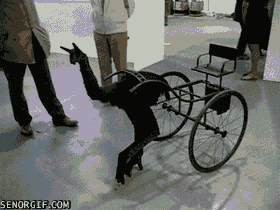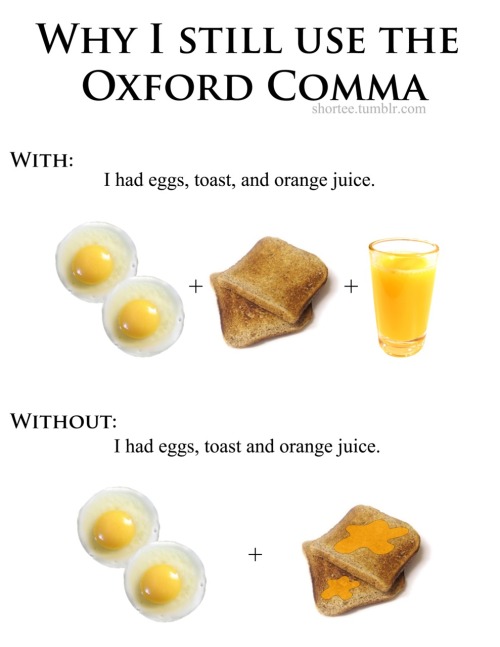Posted on 02/01/2012 12:47:25 PM PST by Daffynition
I’ve edited a monthly magazine for more than six years, and it’s a job that’s come with more frustration than reward. If there’s one thing I am grateful for — and it sure isn’t the pay — it’s that my work has allowed endless time to hone my craft to Louis Skolnick levels of grammar geekery. [snip]
Who and Whom
This one opens a big can of worms. “Who” is a subjective — or nominative — pronoun, along with "he," "she," "it," "we," and "they." It’s used when the pronoun acts as the subject of a clause. “Whom” is an objective pronoun, along with "him," "her," "it", "us," and "them." It’s used when the pronoun acts as the object of a clause. Using “who” or “whom” depends on whether you’re referring to the subject or object of a sentence. When in doubt, substitute “who” with the subjective pronouns “he” or “she,” e.g., Who loves you? cf., He loves me. Similarly, you can also substitute “whom” with the objective pronouns “him” or “her.” e.g., I consulted an attorney whom I met in New York. cf., I consulted him.
This is one of the most common mistakes out there, and understandably so. “That” is a restrictive pronoun. It’s vital to the noun to which it’s referring. e.g., I don’t trust fruits and vegetables that aren’t organic. Here, I’m referring to all non-organic fruits or vegetables. In other words, I only trust fruits and vegetables that are organic. “Which” introduces a relative clause. It allows qualifiers that may not be essential. e.g., I recommend you eat only organic fruits and vegetables, which are available in area grocery stores. In this case, you don’t have to go to a specific grocery store to obtain organic fruits and vegetables. “Which” qualifies, “that” restricts. “Which” is more ambiguous however, and by virtue of its meaning is flexible enough to be used in many restrictive clauses. e.g., The house, which is burning, is mine. e.g., The house that is burning is mine.
This is the crown jewel of all grammatical errors. “Lay” is a transitive verb. It requires a direct subject and one or more objects. Its present tense is “lay” (e.g., I lay the pencil on the table) and its past tense is “laid” (e.g., Yesterday I laid the pencil on the table). “Lie” is an intransitive verb. It needs no object. Its present tense is “lie” (e.g., The Andes mountains lie between Chile and Argentina) and its past tense is “lay” (e.g., The man lay waiting for an ambulance). The most common mistake occurs when the writer uses the past tense of the transitive “lay” (e.g., I laid on the bed) when he/she actually means the intransitive past tense of “lie" (e.g., I lay on the bed).
Contrary to common misuse, “moot” doesn’t imply something is superfluous. It means a subject is disputable or open to discussion. e.g., The idea that commercial zoning should be allowed in the residential neighborhood was a moot point for the council.
They’re similar, but there’s a difference. “Continual” means something that's always occurring, with obvious lapses in time. “Continuous” means something continues without any stops or gaps in between. e.g., The continual music made it the worst night of studying ever. e.g., Her continuous talking drove him crazy.
The word “envy” implies a longing for someone else’s good fortunes. “Jealousy” is far more nefarious. It’s a fear of rivalry, or a suspicion that someone might want what’s yours. Jealousy is also used more often in sexual situations. “Envy” is when you covet your friend’s good looks. “Jealousy” is what happens when your significant other swoons in the presence of your good-looking friend.
“Nor” expresses a negative condition. It literally means "and not." You’re obligated to use the “nor” form if your sentence expresses a negative and follows it with another negative condition. “Neither the men nor the women were drunk” is a correct sentence because “nor” expresses that the women held the same negative condition as the men. The old rule is that “nor” typically follows “neither,” and “or” follows “either.” However, if neither “either” nor “neither” is used in a sentence, you should use “nor” to express a second negative, as long as the second negative is a verb. If the second negative is a noun, adjective, or adverb, you would use “or,” because the initial negative transfers to all conditions. e.g., He won’t eat broccoli or asparagus. The negative condition expressing the first noun (broccoli) is also used for the second (asparagus).
“May” implies a possibility. “Might” implies far more uncertainty. “You may get drunk if you have two shots in ten minutes” implies a real possibility of drunkenness. “You might get a ticket if you operate a tug boat while drunk” implies a possibility that is far more remote. Someone who says “I may have more wine” could mean he/she doesn't want more wine right now, or that he/she “might” not want any at all. Given the speaker’s indecision on the matter, “might” would be correct.
Many writers seem to assume that “whether” is interchangeable with “if." It isn’t. “Whether” expresses a condition where there are two or more alternatives. “If” expresses a condition where there are no alternatives. e.g., I don’t know whether I’ll get drunk tonight. e.g., I can get drunk tonight if I have money for booze.
“Less” is reserved for hypothetical quantities. “Few” and “fewer” are for things you can quantify. e.g., The firm has fewer than ten employees. e.g., The firm is less successful now that we have only ten employees.
The word “farther” implies a measurable distance. “Further” should be reserved for abstract or hypothetical lengths. e.g., I threw the ball ten feet farther than Bill. e.g., The executive climbed further up the ladder of success.
“Since” refers to time. “Because” refers to causation. e.g., Since I quit drinking I’ve married and had two children. e.g., Because I quit drinking I no longer wake up in my own vomit.
Contrary to popular usage, these words aren’t synonymous. A “disinterested” person is someone who’s impartial. For example, a hedge fund manager might take interest in a headline regarding stock performance with which he has no money invested. He’s “disinterested,” i.e., he doesn’t seek to gain financially from the transaction he’s witnessed. Judges and referees are supposed to be "disinterested." If the sentence you’re using implies someone who couldn't care less, chances are you’ll want to use “uninterested.”
Unless you’re frightened of them, you shouldn’t say you’re “anxious to see your friends.” You’re actually “eager,” or "excited." To be “anxious” implies a looming fear, dread or anxiety. It doesn’t mean you’re looking forward to something.
This is a tough one. Words like “rather” and “faster” are comparative adjectives, and are used to show comparison with the preposition “than,” (e.g., greater than, less than, faster than, rather than). The word “different” is not a comparative adjective; it's used to draw distinction. When “different” is followed by a prepositional phrase, the preposition should be “from,” similar to “separate from,” “distinct from,” or “away from.” e.g., My living situation in New York was different from home. There are rare cases where “different than” is appropriate, if “than” operates as a conjunction. e.g., Development is different in New York than in Los Angeles. When in doubt, use “different from.”
In order to employ proper usage of “bring” or “take,” the writer must know whether the object is being moved toward or away from the subject. If it is toward, use “bring.” If it is away, use “take.” Your spouse may tell you to “take your clothes to the cleaners.” The owner of the dry cleaners would say “bring your clothes to the cleaners.”
It isn't a word. "Impact" can be used as a noun (e.g., The impact of the crash was severe) or a transitive verb (e.g., The crash impacted my ability to walk or hold a job). In no way should this word be assembled into a modifier. "Impactful" is a made-up buzzword, colligated by the modern marketing industry in their endless attempts to decode the innumerable nuances of human behavior into a string of mindless metrics. Seriously, stop saying this.
Here’s a trick to help you remember: “Affect” is almost always a verb, and “effect” is almost always a noun. e.g., Facebook affects people’s attention spans, and the effect is usually negative. “Affect” means to influence or produce an impression — to cause hence, an effect. “Effect” is the thing produced by the affecting agent; it describes the result or outcome. There are some exceptions. “Effect” may be used as a transitive verb, which means to bring about or make happen. e.g., My new computer effected a much-needed transition from magazines to Web porn. There are similarly rare examples where “affect” can be a noun. e.g., His lack of affect made him seem like a shallow person.
Too many people claim something is the former when they actually mean the latter. For example, it’s not “ironic” that “Barbara moved from California to New York, where she ended up meeting and falling in love with a fellow Californian.” The fact that they’re both from California is a "coincidence." "Irony" is the incongruity in a series of events between the expected results and the actual results. "Coincidence" is a series of events that appear planned when they’re actually accidental. So, it would be "ironic" if “Barbara moved from California to New York to escape California men, but the first man she ended up meeting and falling in love with was a fellow Californian.”
Undoubtedly the most common mistake I encounter. Contrary to almost ubiquitous misuse, to be “nauseous” doesn’t mean you’ve been sickened: it actually means you possess the ability to produce nausea in others. e.g., That week-old hot dog is nauseous. When you find yourself disgusted or made ill by a nauseating agent, you are actually “nauseated.” e.g., I was nauseated after falling into that dumpster behind the Planned Parenthood. Stop embarrassing yourself.
If you’re looking for a practical, quick guide to proper grammar, I suggest the tried-and-true classic The Elements of Style, by William Strunk, Jr. and E. B. White. A few of these examples are listed in the book, and there are plenty more. Good luck!
I am reading a book where the four-dot ellipsis is preceded by a space. The only time this doesn’t happen is in extracts, which were probably copied and pasted from the Net and so are done correctly. This really bothering me. I think I’m nuts.
Don’t worry about the one space or two spaces after a sentence. Everything that goes to press is searched for double spaces over and over again until there are no more left (to catch three spaces, four spaces, etc.).
Spaces and dots are my specialty.
LoL :)
I will work on that one when I get some time from WoW .. just got Cataclysm working (after tweaking for about 12 hours >.< )
;)



The double space was common practice with fixed fonts, as in typewritten. Proportional fonts insert a space-and-a-half automatically. That is why Word flags the double space as an error.
&&
Thank you for that information. FReepers are so smart.
I’ll keep working on breaking my old habit with the spaces.
The double space was common practice with fixed fonts, as in typewritten. Proportional fonts insert a space-and-a-half automatically. That is why Word flags the double space as an error.
&&
Thank you for that information. FReepers are so smart.
I’ll keep working on breaking my old habit with the spaces.
Relative ambiguity!
[Sorry, couldn't resist.]
See Poser’s #118 for why two spaces is incorrect 99+% of the time today.

Yep, I learned on a manual typewriter around 1964. It is difficult for me to shed that old training.
The article was discussing English Grammar.
‘X < 5’ is NOT a statement or expression in English; it is a mathematical phrase which has its own ‘grammar’.
Now, who’s confused ?
One Man’s Opinion
21stCenturion
You.
ML/NJ
That does it. I'm going on strike in protest of the periods lack of space now used. I will not type again until the world sees it my way and makes two spaces standard again.
Never again. I won't type ever.
Not even to respond or anything at work for......Starting to sound like some other protesters?
Out of say, fifty varying but similar items, I'm holding three I like in my right hand (naturally) and three I like less in my left hand but also unstated but implied are the rejected other 44 items that are equally referenced.
Probably still wrong but I can't help myself. ;-)
For my part, personally, if you asked me, I cannot understand how people mix up "lose" and "loose".
It is not a FReeper "funny" usage like "series" for "serious", "hugh" for "huge", etc. as far as I know. Feel free to correct me. FWIW.
Heh. When correcting someone on their grammar your correction better be error free. Trust me. ;-)
....oh wrong thread sorry!
Excellent ... ;-)
Disclaimer: Opinions posted on Free Republic are those of the individual posters and do not necessarily represent the opinion of Free Republic or its management. All materials posted herein are protected by copyright law and the exemption for fair use of copyrighted works.